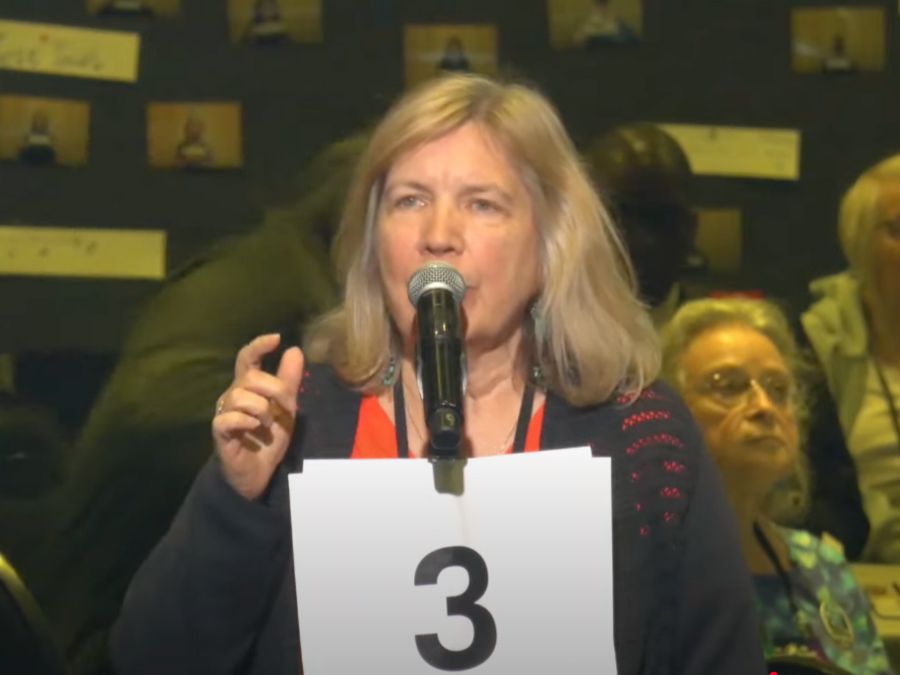The United Church of Canada sets minimum salaries for ministry personnel, but a denominational task group report revealed that 85 percent of ministers negotiate pay between 10 and 15 percent above the base wages.
After the last General Council in 2022, the Total Compensation Review Task Force began studying compensation practices through the lenses of equitableness, adequacy and sustainability.
You may unsubscribe from any of our newsletters at any time.
The group held consultations with church treasurers and ministry personnel and surveyed both groups with questions of sustainability, adequacy and annual adjustment. Over 1,100 ministry personnel, church members and staff provided input. The task group’s conclusion: the current model is working relatively efficiently and effectively with limited inequities evident.
On Sunday, Aug. 10, the delegates to the United Church’s General Council 45 in Calgary voted to receive the task group’s report. They also voted to add the words “fair, just and equitable” to The Manual’s wording on remuneration for ministry personnel, and to encourage regional councils to seek to provide full-time positions wherever possible so that — in the words of the proposal — ministry personnel don’t have to “cobble together” full-time equivalencies.
In its proposal to the 45th General Council, the task group also outlined 10 additional assignments for the General Secretary to carry forward, but it was the recommended review minimum salaries for ministry personnel that generated the most lively discussion.
Ordered ministers in their first two years of service must be paid a minimum of $56,094 to $79,443 annually; the range of minimums is tied to cost-of-living differences across Canada. Similarly, those with 14 years’ experience or more must be paid at least $65,973 and $89,324, depending on where they live. Further variations come into play, for example, when a manse is provided.
The task group recommended that that the General Secretary study the relative parity of United Church minimum salaries compared with the minimums of the Presbyterian, Evangelical Lutheran and Anglican churches, and consider changes based on the findings.
But for Rev. Elizabeth Mackenzie, commissioner from Shining Waters Region, that recommendation didn’t go far enough.
Stepping up to the microphone, she said, “One of the things we don’t know is who those 15 percent of ministry personnel are who are not negotiating above the minimum salary and why that’s happening.” She argued that simply looking at compensation for clergy of other denominations doesn’t get at the question of whether the United Church’s minimum salary “is adequate or whether it in fact needs to be adjusted upwards so ministry personnel don’t always have to be negotiating above.”
More from General Council 45:
- United Church apologizes to 2SLGBTQIA+ people in moving service
- Kimberly Heath elected as United Church’s next moderator
- United Church projects losing 65% of members in the next decade
Rev. Monica Rosborough, minister at Athabasca (Alta.) United Church representing Northern Spirit Region, seemed to take issue with Mackenzie’s words. “I am one of those 15 percent. I live in one of the poorest regions. I live in one of the poorest communities,” she said. “It’s nobody’s business but mine why I don’t renegotiate, but between you, me and the four walls privately, I like living in my small town. I like working there. I earn way more than minimum wage. I am very privileged.”
MacKenzie returned to the microphone to clarify her position. “I am not speaking about personal decisions in negotiations; I am speaking about the systemic issue of whether in fact the current minimums are a fair minimum… Pay inequities are ‘the systemic discrimination that keeps on giving,’ as I say, because it doesn’t just affect your salary now, it affects your pension in the future.”
The motion was amended to allow the General Secretary study minimum salaries both in comparison with other denominations and within the United Church itself.
Other directions for the General Secretary that were passed included:
- eliminating specific by-laws that confound or complicate collaborative ministries employment
- working with the National Indigenous Council to develop a compensation model, and funding for that model, that is relevant to remote Indigenous communities.
- exploring the feasibility and acceptance of centralizing payroll administration
- annually adjusting minimum salaries by the annualized Consumer Price Index (CPI) if 3% or less; when the CPI exceeds 3%, staff will look at other data including wage predictions, other denominations’ adjustments as well as not-for-profit and social service collective agreements to help the General Council Executive figure out an adjustment
***
Gillian Steward is a journalist in Calgary.














Given that our denomination is facing a severe decline in numbers, is it reasonable to expect that clergy can receive higher & higher compensation from a dwindling base of people who give? It puts a lot of pressure on those people still coming to church and pressure on our church councils to come up with a balanced budget. My church is working hard to balance expenses vs income with a 75% ministerial position.